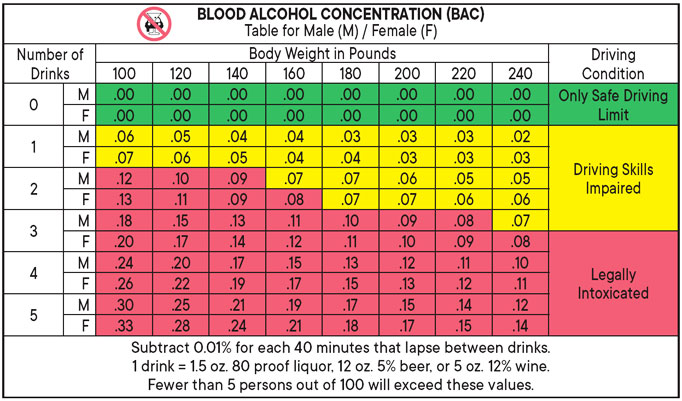Study the BAC Table
On the official California DMV Test, there is always a question (or two) based on the table showing BAC estimates based on how many drinks a person drinks, their gender, and body weight.
Ensure you study the table and understand what it tries to tell you.
Know When You are Legally Intoxicated
In California, it is illegal for you to drive if you have a BAC of:
- 0.08% or higher (21 years or older).
- 0.01% or higher (Under 21 years old).
- 0.01% or higher (If on DUI probation).
- 0.04% or higher (Commercial vehicle).
- 0.04% or higher (Driving a passenger for hire).
Even if your BAC is below legal limits, that does not mean it is safe for you to drive. Remember, even a single drink can affect your ability to drive safely.

Why Gender and Weight Matters
Women generally have less water and more body fat per pound of body weight. Since fat doesn’t absorb alcohol as quickly as other cells, more alcohol remains in the bloodstream of women.
A woman weighing 100 lbs. can be legally intoxicated after her second drink.
Study the BAC table and see how women and men are affected by a few drinks.
You should also notice that the more you weigh, the less you will be affected by alcohol. But when two people weigh the same, the body fat percentage will make a difference.
What is One Drink?
Read the small print below the table.
In the United States, a standard drink contains about 0.6 fl oz. or 14 grams of pure alcohol.
It roughly corresponds to the following:
- 1.5 fl oz. Shot of 80-proof distilled spirits.
- 12 fl oz. of regular beer (5 %).
- Five fl oz. of table wine (12 %).
In other words, it doesn’t matter if you drink a standard-size glass of beer, wine, or spirits; they all contain the same amount of pure alcohol and will affect you the same way.
A 16 oz. glass of beer, for example, is more than the standard drink. Since beers can contain more than 5 % alcohol (ABV), 16 oz. of beer can contain up to 2 ounces of pure alcohol (more than three standard drinks).

